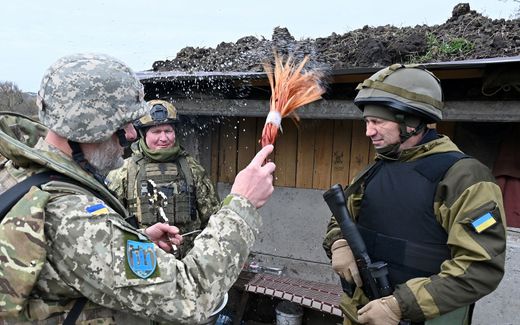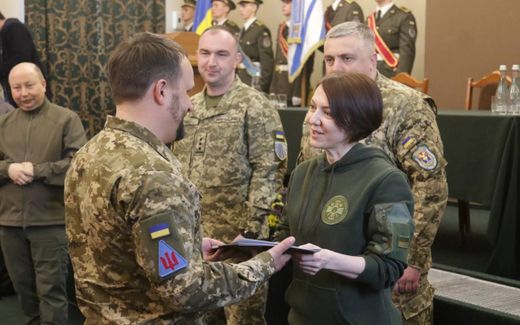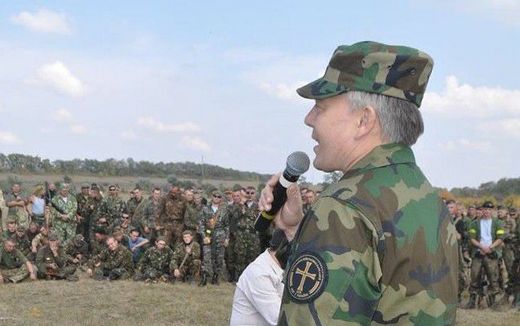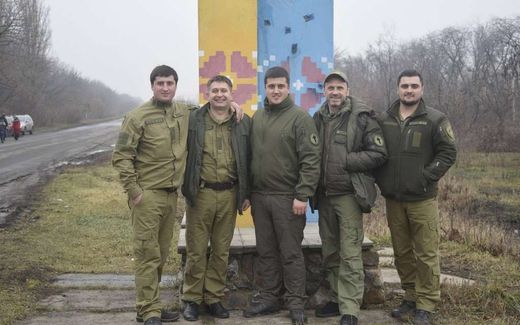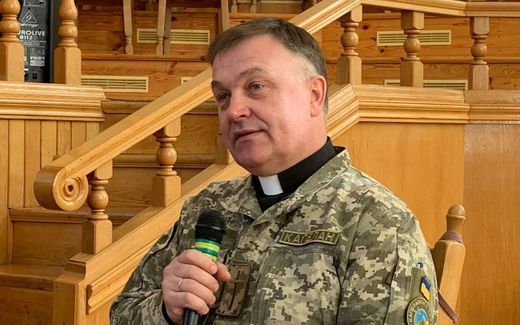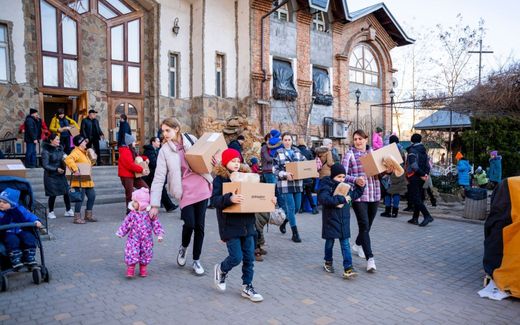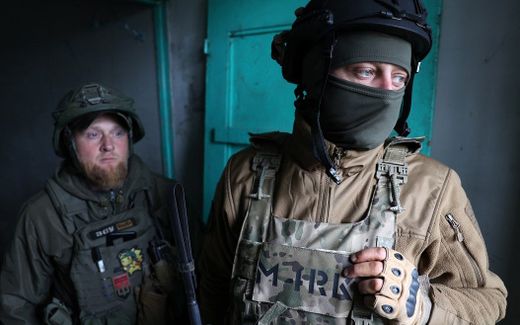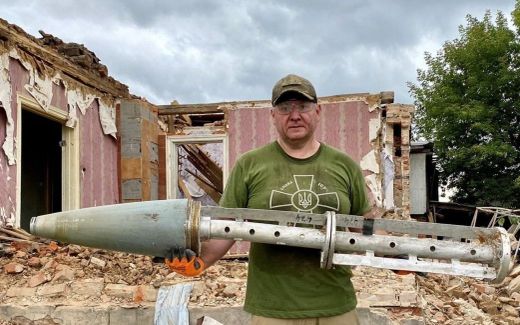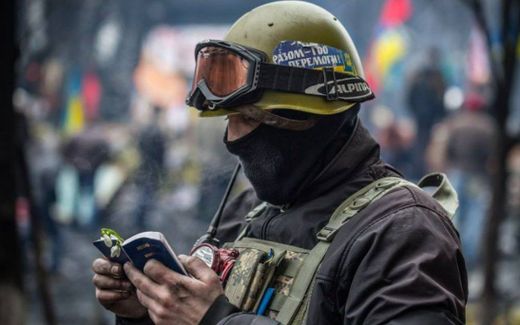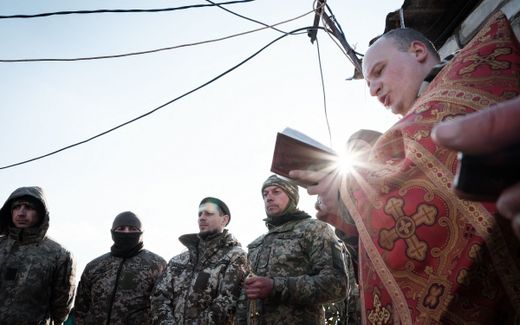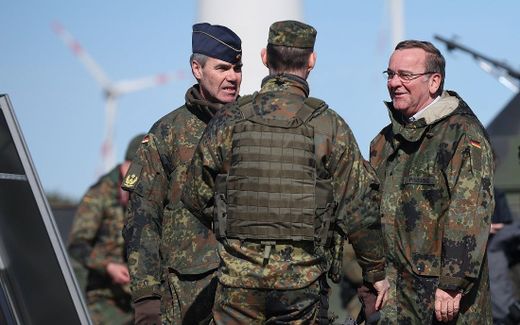Ukrainian chaplains offer hope in devastated town of Bakhmut
12-08-2023
Eastern Europe
Gerard ten Voorde, RD
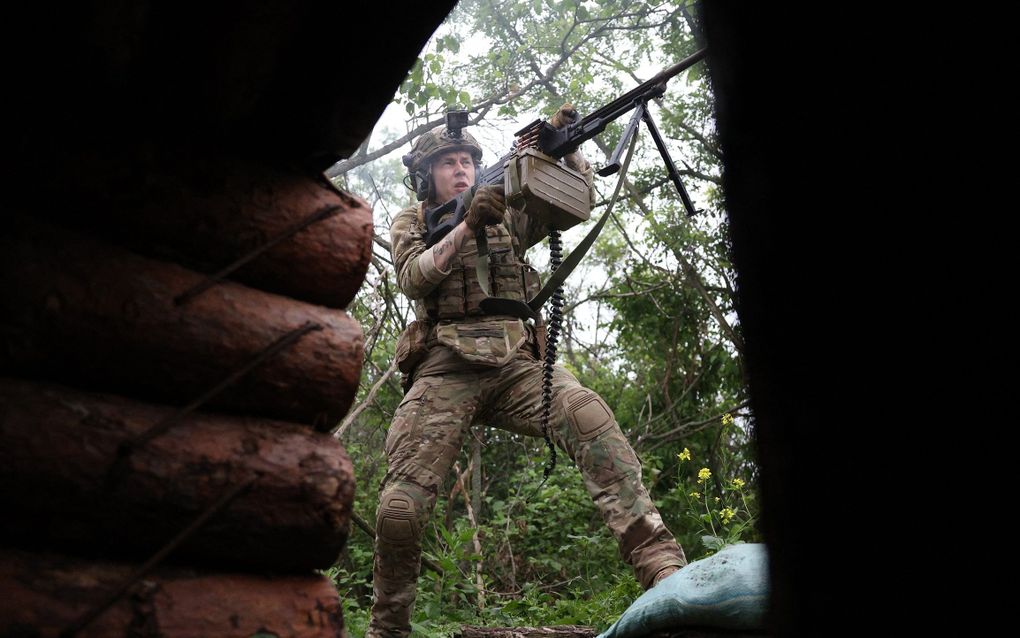
Ukrainian soldier fighting by Bakhmut. Photo AFP, Anatolii Stepanov
Eastern Europe
Ukrainian army pastors Viktor Morozoek and Igor Rozvodovsky offer help in the horrific horrors at Bakhmut. "We want to serve as Christ served."
Bakhmut, the hard-hit town in eastern Ukraine, is a ruin. Burnt. Charred. Destroyed. The Russians managed to capture Bakhmut in late May. Slowly but surely, the tide turns. Ukraine manages to almost encircle Bakhmut. For about a week and a half, the Ukrainian army has been able to fire artillery cannons at the entire urban area. The bloody battle for the city brings immense losses. Tens of thousands of Russian soldiers, Wagner mercenaries and Ukrainian men have been killed.
War violence
Three to four kilometres away from the front line in Bakhmut, Victor Morozoek (33) and Igor Rozvodovski (33) are working as army pastors at a "stabilisation post", where the first medical assistance behind the front line takes place. Recently, they were in the Netherlands at the invitation of the Metadidomi Foundation, which provides aid in Ukraine, to share experiences of working on the front line.
War violence plagues Bakhmut to the bone. "Battles sometimes take place 50 to 100 metres away from us," Rozvodovsky says. "The distance a machine gun can cover." During heavy Russian attacks, victims pour into the medical post. Traumatised. Badly wounded. Or killed.
The chaplains try to make themselves useful. "Sometimes we carry victims to the operating table. We give them a cup of coffee or tea. Sometimes we can give the boys some food. Or medicine. Sometimes we have some clothes for them."
Desastrous
The consequences of the war have been disastrous. "Everywhere the Russians have been is black. Literally. Everything is broken; everything is burnt. Nothing is left standing. Of 60-centimetre-thick trees, only stumps remain in a blackened environment."

The situation at the front is tough. "The Russians have an enormous excess of firepower," says Rozvodovsky. "They don't look at anything but are constantly taking the Ukrainian positions under fire. Our guys try to repel the attacks, but the Russians just come and come and come."
A Thursday at the stabilisation post is stuck in Morozoek's memory. "The building was shaking under the impacts of Russian shells. One every minute. "The doors jumped open due to the pressure of the shell impacts," says the chaplain, dressed in an army shirt and camouflage trousers.
"I saw the fear in the eyes of the surgeons and medical staff. Their hands were shaking. All the operating tables were occupied. Stretchers with victims were everywhere in the corridors. Bloody. We couldn't go anywhere."
Morozoek fulfils his pastoral duties. "In the corridor, I said a prayer. Out loud, so everyone could hear it. A prayer that God would preserve us and spare our lives. I asked for the medical staff to continue working. The flow of casualties did not stop, and the explosions continued."
Power of prayer
The chaplain believes in the power of prayer. "God gives strength at such a moment. A few days later, a surgeon said: it was really a miracle. Our fear was removed. We could continue working." The army pastor falls silent for a moment. "We have an all-mighty God. A God Who is stronger than the violence of the enemy."
Working among the dead and wounded takes a lot out of army preachers. "The hardest part is taking care of soldiers from a unit where no one else has survived. The tears often flow copiously."
Morozoek (married, three children aged 10, 7 and 4) and Rozvodovski (married, two children aged 4 and 1.5) are always prayerfully preparing for their mission at the front. Family, friends and members of their congregation also engage in prayer. "The home front finds it very difficult, but they let us go. We serve there, but they serve at home with us. The most powerful answer to prayer is that we come back alive from the war zone every time."
Silence
The army pastors experience harrowing situations, Morozoek says. "Once, we had to wrap a fallen soldier in a body bag. Just as we finished, his mobile phone went off. We opened the bag again. On the screen was the caller's name: 'My dear wife'. That is a very difficult moment. Many emotions come to the surface then. We put the phone back and took a step back."
What does such an event do to chaplains? For a moment, there is silence. "Something like that is difficult. Very difficult," Morozoek then says. It touches deeply indicates Rozvodovsky. "You don't forget a moment like that."
During a conversation with a soldier who has just lost several comrades, Rozvodovsky is able to offer him internet via hotspot for contact with the home front. "I accidentally saw the text message he typed: "My body is alive, but my spirit is dead." Such things I cannot forget."
Morozoek reports not only seeing the horrors at the front but also smelling them. Not only there. Also upon returning home. "The smell of death. Even now, during this interview, events from Bakhmut come to my mind razor-sharp."
Sounding board
At the stabilisation post, chaplains try to strike up a conversation and sympathise with soldiers. "We start our talk by saying we are grateful that they are defending our country. For example, we inquire about what they did before the war and what they lost in the war. That's how we try to be a sounding board. That is our mission," says Morozoek.
Military personnel in the army are not used to anyone having friendly and compassionate conversations with them. "A commander does not ask what they feel. That is why soldiers find it so important and valuable that someone speaks a few words of hope and love and prays for them. That is why we are so much needed there."
Soldiers on the front line in Ukraine face death every day. They think a lot about life and death. "We remind soldiers that it is grace that they are still alive. We also ask if we can give thanks together that they are still alive."
Conversation
Not everyone is waiting for the two pastors' message. "We have to be sensible. We have to sense when we can say something. Especially with soldiers who have just lost many colleagues, we have to be very careful. There are also soldiers who are very disappointed in God and don't want to know anything about Him. Fortunately, there are very few of them."
The pastors "do not preach" but simply engage in conversation, Rozvodovsky indicates. If they see that someone responds positively, it is never difficult "to step into the soul", says the army pastor, quoting a Ukrainian saying. "We always talk about faith; we try to give hope."
Faith
So what message do the pastors bring? "We keep it simple. The most important thing is that we speak to our boys about Christ. If a soldier is open to it, we point him to Christ. We often quote the text: Believe in the Lord Jesus Christ, and you will be saved."
The preachers quote more encouraging texts. "Romans 8, for example. If God is for us, who will be against us? Or Psalm 23: Though I went through a valley of the shadow of death, I would not fear."
Right words
The guidance of the Holy Spirit is much needed in pastoral work, Morozoek argues. "Of ourselves, we often know nothing to say. We are very weak. Therefore, we need a lot of strength from above. But through the Holy Spirit, we get the right words."
Rozvodovsky recalls a moment when he tried to strike up a conversation with a soldier who had just arrived. "The conversation went nowhere. I went to get coffee, made a prayer for words and went back. A few seconds later, that soldier himself started asking questions. At such a moment, I feel that God is with us," says Rozvodovsky, pointing out that it is not about them but about the Lord's work.
"God has taught us how to pasture sheep, how to care for souls," says Morozoek. "We try to be the hand of Jesus Christ in our work. To give the military something of the love of Christ. To serve as Christ served."
More than once, good conversations arise. Army preachers often refer to the military as "the heroes" of Ukraine. "The soldiers, however, turn it around. They think we are heroes. But we say: our work does not nearly amount to what you give at the front."
Loving the enemy
Bible texts can sometimes suddenly take on a different connotation in a war situation. How do pastors experience the Biblical command to love their enemies? "Enemies exist on different levels. People with whom you have a conflict, for example." Morozoek grabs his smartphone and searches in his online Bible. "Romans 1 talks about people who know God yet have not glorified or thanked Him. Those are also enemies."
Ukraine faces brutal, ruthless opponents in the war. "We see enemies who kill, loot, rape women and children and castrate men. That is absolutely not of God, but those are fruits of sin," Morozoek said.
The Bible indicates that the sword may be raised against evil, Rozvodovsky adds. "Our soldiers may fight and fight back to defend our country. In this, our soldiers are God's servants, as Romans 13 says. To you for good. The government does not bear the sword in vain."
Ukraine also shows love to its enemies, according to Rozvodovsky. "Our military does not kill Russians in cold blood but takes them prisoner of war. Ukrainian soldiers, however, cannot say: we love you, and we won't do anything more. Then they will be shot. They do have to defend themselves."
Forgiveness
The question of the need to forgive Russians for their wrongdoings may seem very inappropriate to a Ukrainian. Yet army pastors do not shy away from the question. "Personally, I could forgive if there is repentance and sincere repentance and if it is asked for, " Rozvodovsky says. "The Bible asks that of us."
How hard is it to forgive? For a moment, silence falls. Morozoek reflects. "I cannot give a ready-made answer to that. In my family, no people have been killed or raped. My children are still alive. My heart hurts. There are Ukrainians who did experience that. I can understand that they would like to see retribution."
Desert
Can the pastors understand that God allows the horrors of the Russians in their country? "Yes," says Morozoek. "Nothing goes beyond God's will. I am 100 per cent convinced that God is allowing this and has a plan with this. Therefore, more than ever, we need to live close to God.
The people of Israel suffered greatly in Egypt and travelled through the desert for 40 years. God was always with them in those circumstances. God has promised not to leave us alone. With Him, we can get through this. Nothing can separate us from the love of Christ."
This article was translated by CNE.news and published by the Dutch daily Reformatorisch Dagblad on July 29, 2023
Related Articles

